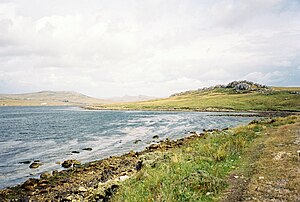
Back Batalla del monte Tumbledown Spanish Battaglia di Mount Tumbledown Italian Slaget ved Mount Tumbledown NB
| Battle of Mount Tumbledown | |||||||||
|---|---|---|---|---|---|---|---|---|---|
| Part of the Falklands War | |||||||||
 Mount Tumbledown, Two Sisters, and Wireless Ridge, as seen from Stanley Harbour. | |||||||||
| |||||||||
| Belligerents | |||||||||
|
|
| ||||||||
| Commanders and leaders | |||||||||
|
|
| ||||||||
| Units involved | |||||||||
|
|
5th Naval Infantry Battalion 1st Marine Field Artillery Battalion 1st Marine Anti-Aircraft Regiment 4th Infantry Regiment 12th Infantry Regiment | ||||||||
| Strength | |||||||||
|
641 soldiers 2 Scorpion light tanks 2 Scimitar light tanks 2 frigates |
700 marines 200 soldiers 3 Tigercat SAMs | ||||||||
| Casualties and losses | |||||||||
|
10 killed[1] 35[1]-53 wounded[2] |
30 killed[1] 30 captured | ||||||||
The Battle of Mount Tumbledown was an engagement during the Falklands War. The engagement was an attack by the British Army and the Royal Marines on the heights overlooking Stanley, the Falkland Islands capital. Mount Tumbledown, Mount William and Sapper Hill lie west of the capital. Due to their proximity to the capital, they were of strategic importance during the 1982 War. They were held by the Argentine 5th Naval Infantry Battalion (BIM 5), a reinforced, cold weather trained and equipped Marine battalion.
The assaulting British forces were the 2nd Battalion, Scots Guards, 42 Commando, Royal Marines Mortar platoon and four light tanks of the Blues and Royals. The 1st Battalion, 7th Duke of Edinburgh's Own Gurkha Rifles were held in reserve.
One of a number of night battles that took place during the British advance towards Stanley, the battle led to British troops capturing all the heights above the town, allowing the town's capture and the surrender of the Argentine forces on the islands.
© MMXXIII Rich X Search. We shall prevail. All rights reserved. Rich X Search